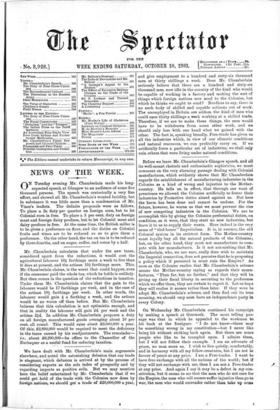Before we leave Mr. Chamberlain's Glasgow speech, and all its
well-meant rhetoric and enthusiastic sophistries, we must comment on the very alarming passage dealing with Colonial manufactures, which evidently shows that Mr. Chamberlain regards the establishment of manufacturing industries in the Colonies as a kind of wrong and injustice to the Mother- country. He tells us, in effect, that through our want of prescience we allowed the Colonies artificially to foster their industries by Protective duties aimed against us. But here the harm has been done and cannot be undone. For the future, however, he warns us that we must prevent the rise of new competing industries in the Colonies. We are to accomplish this by giving the Colonies preferential duties, on condition, as it were, that they start no new industries, but leave it to us to supply their wants. Here indeed is the very acme of " tied-house " Imperialism. It is, in essence, the old Colonial system in its strictest form. The Mother-country must loyally buy all the natural products of the Colonies ; but, on the other hand, they must not manufacture to corn- pets with her manufactures. Is it not astonishing that Mr. Chamberlain, who, we are sure, really does wish to maintain the Imperial connection, does not perceive that he is proposing a policy which if persisted in must ruin the Empire ? As soon as the Colonies realise that Mr. Chamberlain's scheme means the Mother-country saying as regards their manu- factures, " Thus far, but no farther," and that they will be giving up their fiscal liberty in assenting to the preference which we offer them, they are certain to regret it. Let us hope they will realise it sooner rather than later. If they were to adopt Mr. Chamberlain's scheme, and then find out its true meaning, we should very soon have an independence party in every Colony.














































